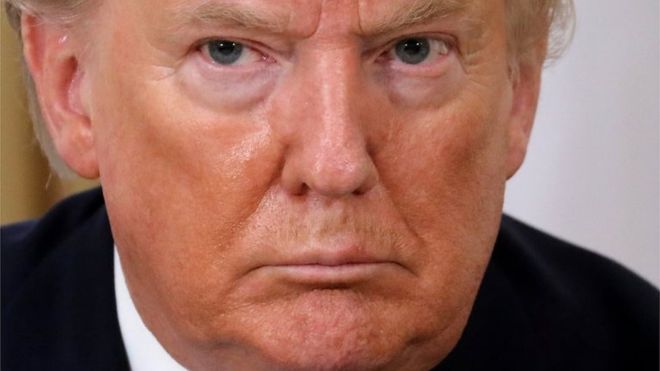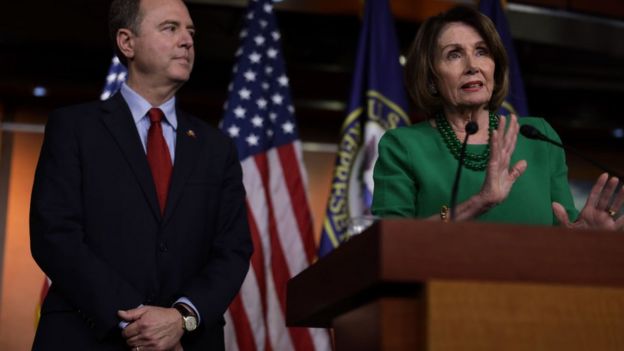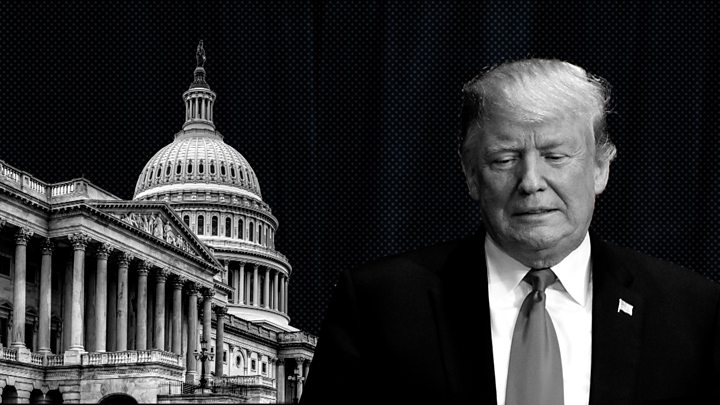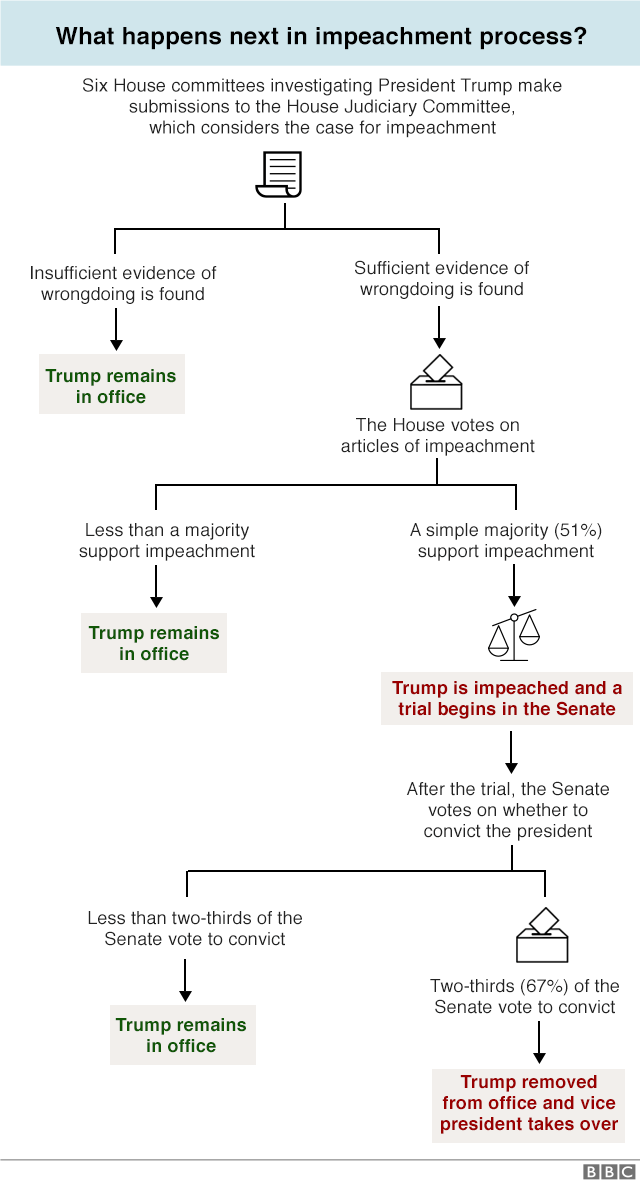US: Trump impeachment evidence overwhelming – House report
From BBC

Evidence for impeaching Donald Trump for misconduct in office is “overwhelming”, according to the panel leading the US impeachment inquiry.
The president placed personal political interests “above the national interests of the United States,” it states in a key report to US House lawmakers.
Evidence of misconduct was overwhelming “and so too is the evidence of his obstruction of Congress,” it adds.
The report is designed to lay out the case to remove Mr Trump from office.
He denies any wrongdoing, describing the inquiry as a witch-hunt.
Before the draft report was released, the Republican president had attacked the Democrats-led investigation as “very unpatriotic”.
Following the publication, White House press secretary Stephanie Grisham said the Democrats “utterly failed to produce any evidence of wrongdoing” and that the report “reflects nothing more than their frustrations”.
Among formal impeachment charges expected to be considered are abuse of power, obstruction of justice and contempt of Congress, the BBC’s Chris Buckler in Washington says.
None of that will come as a surprise to Mr Trump or members of his Republican party – but it will infuriate the president, our correspondent adds.




Want to find out more?


- A SIMPLE GUIDE: If you want a basic take, this one is for you
- GO DEEPER: Here is a 100, 300 and 800-word summary of the story
- WHAT IS IMPEACHMENT? A political process to remove a president
- VIEW FROM TRUMP COUNTRY: Reaction from a West Virginia town
- CONTEXT: Why Ukraine matters to the US
- FACT-CHECK: Is the whistleblower linked to the Democrats?




What does the report say?
The report – The Trump-Ukraine impeachment Inquiry Report – was made public on Tuesday by the House Permanent Select Committee on Intelligence.
It said the inquiry “uncovered a months-long effort by President Trump to use the powers of his office to solicit foreign interference on his behalf in the 2020 election.


It said Mr Trump’s “scheme subverted US foreign policy toward Ukraine and undermined our national security in favour of two politically motivated investigations that would help his presidential re-election campaign.
“The president demanded that the newly-elected Ukrainian President, Volodymyr Zelensky, publicly announce investigations into a political rival that he apparently feared the most, former Vice-President Joe Biden, and into a discredited theory that it was Ukraine, not Russia, that interfered in the 2016 presidential election,” the report says.
What happens next?
The intelligence committee is expected to vote along party lines later on Tuesday to approve its report summing up the evidence against President Trump.
The report will then be submitted to the House Judiciary Committee, which will start its own proceedings on Wednesday, hours before Mr Trump is due to return to Washington.
The judiciary panel’s hearings will begin with four constitutional scholars, who will explain how impeachment works.
The White House has refused to participate in the hearings, citing a lack of “fairness”.
Democrats are keen to hold a vote on impeaching Donald Trump before the end of the year, setting up the potential of a trial in the Senate perhaps as early as January, our correspondent says.
What are Republicans saying?
Before the draft report was made public, House Republicans released their own123-page report that condemned the “unelected bureaucrats” who testified, saying they “fundamentally disagreed with President Trump’s style, world view and decisions”.
The document accuses Democrats of “trying to undo the will of the American people” and argues that they have been trying to depose the president since his first day in office.
“None of the Democrats’ witnesses testified to having evidence of bribery, extortion, or any high crime or misdemeanours,” it argues, in reference to the constitutional clause that permits the removal of a president.
House Intelligence Committee Chairman Adam Schiff dismissed the Republican rebuttal, saying it was “intended for an audience of one”, Mr Trump, and “ignores voluminous evidence “against him.
In London, Mr Trump slammed Mr Schiff by name, calling him “a maniac”, “a very sick man” and “a deranged human being”.
“I think he grew up with a complex for lots of reasons that are obvious,” the US president said.
What is Trump accused of?
Democrats say Mr Trump dangled two bargaining chips – $400m (£309m) of military aid to Ukraine that had already been allocated by Congress, and a White House meeting with Ukraine’s new leader. They think this political pressure on a vulnerable US ally amounts to an abuse of power.
The first investigation Mr Trump wanted from Ukraine was into one of his main Democratic challengers, Joe Biden, and his son Hunter. Hunter joined the board of a Ukrainian company when Joe Biden was US vice-president.
The second Trump demand was that Ukraine try to corroborate a conspiracy theory that Ukraine, not Russia, interfered in the last US presidential election. This theory has been widely debunked, and the US intelligence agencies are unanimous in saying Moscow was behind the hacking of Democratic Party emails in 2016.
How does impeachment work?
Impeachment is the first part – the charges – of a two-stage political process by which Congress can remove a president from office.
If, following the hearings, the House of Representatives votes to pass articles of impeachment, the Senate is forced to hold a trial.


A Senate vote requires a two-thirds majority to convict and remove the president – unlikely in this case, given that Mr Trump’s party controls the chamber.
Only two US presidents in history – Bill Clinton and Andrew Johnson – have been impeached, but neither was convicted.
President Richard Nixon resigned before he could be impeached.






To learn more about the impeachment inquiry and more on this story go to: https://www.bbc.com/news/world-us-canada-50650216




